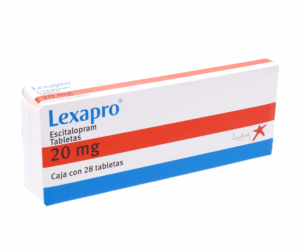Description
Where to buy Lexapro for Anxiety online?
Lexapro for Anxiety provides effective treatment by addressing chemical imbalances in the brain that cause persistent anxious thoughts.
It helps people lower their anxiety levels, improve their emotional stability, and enhance their quality of life.

Many patients report fewer panic attacks, better sleep, and improved concentration with regular Lexapro use.
By regulating serotonin levels, Lexapro promotes a calmer mood and better stress management.
This medication is widely prescribed due to its favorable safety profile and proven success in treating generalized anxiety disorders.
Consult with a healthcare provider to see if Lexapro is right for you.
Lexapro is increasingly used to treat anxiety because it works safely and improves daily emotional health.
What is Lexapro?
Lexapro is currently an SSRI that effectively balances serotonin levels in the brain.
It helps people to remain emotionally stable while effectively managing depression, anxiety, and related mental disorders.
Doctors often prescribe Lexapro because it provides excellent results with minimal side effects.
How does Lexapro work for anxiety?
Lexapro boosts serotonin, which promotes emotional balance and significantly reduces the symptoms of intense anxiety.
Because serotonin regulates mood, Lexapro stabilizes emotions and improves mental clarity and focus in daily life.
It prevents the reuptake of serotonin, which helps maintain elevated serotonin levels in the brain and promotes improved mental health.
Why Doctors Recommend Lexapro for Anxiety?
Medical experts currently recommend Lexapro because it provides long-lasting results with fewer complications.
Compared to older medications, Lexapro is safer and more effective in managing chronic anxiety disorders.
Patients report consistent improvement, which encourages doctors to continue prescribing Lexapro for anxiety.
Lexapro for Everyday Anxiety
Lexapro helps people feel calmer, more focused, and more emotionally balanced in their daily responsibilities and routines.
Patients report a decrease in panic attacks and racing thoughts after regular daily use of Lexapro.
As a result, they perform better at work, sleep more soundly at night, and enjoy their relationships without the constant stress.
Lexapro for Anxiety and Depression
Doctors also use Lexapro for anxiety and depression, because these conditions often coexist in patients.
Lexapro helps patients cope with sadness and anxiety at the same time, which creates greater emotional resilience and serenity.
Patients recover faster when Lexapro treats both anxiety and depression under medical supervision.
Lexapro Dosage
Most patients start with a low dose of Lexapro for anxiety, usually about 10 mg once a day.
Doctors gradually increase the dose, depending on the patient’s response and tolerance to the medication.
Lexapro is usually taken at the same dose every day, in the morning or evening, with food.
Lexapro Anti-Anxiety Treatment Duration
It usually takes several weeks for patients to notice consistent improvement in their symptoms after treatment with Lexapro.
Although some changes occur within a few days, the full effects develop gradually over four to six weeks.
Doctors recommend that patients continue treatment with Lexapro, even if progress seems slow or uneven at first.
Lexapro Side Effects
Lexapro causes mild side effects, including nausea, headache, fatigue, and in some cases dry mouth.
However, these symptoms generally disappear once the body has adjusted to Lexapro and has developed an internal tolerance to the drug.
Doctors closely monitor patients for possible serious side effects while they continue treatment with Lexapro for anxiety safely and effectively.
Risks of Using Lexapro
Although Lexapro for anxiety is generally safe, some people may occasionally experience negative reactions or complications.
People with bipolar disorder may experience mood swings or manic episodes if Lexapro is used without a proper psychiatric evaluation.
Lexapro for anxiety is not suitable for people taking MAOIs due to dangerous interactions and potential medical emergencies.
Drug Interactions with Lexapro
Lexapro interacts with several medications, including blood thinners, migraine medications, and herbal supplements.
Doctors evaluate a complete medical history before prescribing Lexapro to prevent interactions and ensure the safety of the treatment.
Combining Lexapro for anxiety with other serotonergic medications can cause serotonin syndrome, a dangerous and potentially fatal condition.
Lexapro and Alcohol
Doctors advise patients not to combine Lexapro with alcohol, as it significantly reduces brain function.
Alcohol increases dizziness and drowsiness and reduces the effectiveness of Lexapro for anxiety and emotional distress.
Patients are advised to avoid alcohol completely when using Lexapro regularly and responsibly.
Lexapro for Long-Term Anxiety Relief
Lexapro is most effective when used regularly over a long period, under medical supervision, and with appropriate support.
Patients experience fewer symptoms and greater emotional stability when they adhere strictly to their treatment plan.
Doctors assess progress during follow-up visits and adjust Lexapro dosage to help control anxiety.
Lexapro for Anxiety and Therapy
Therapists combine Lexapro with cognitive behavioral therapy (CBT) to help patients effectively manage their thoughts and emotions.
CBT teaches strategies to reframe anxious thoughts, while Lexapro reliably balances brain chemicals internally.
The combination of therapy and Lexapro produces lasting improvements in emotional control and behavioral patterns.
Stopping Lexapro
Suddenly stopping Lexapro causes withdrawal symptoms such as irritability, nausea, and sleep disturbances in patients.
Doctors gradually reduce the dosage to help the body adjust and prevent significant mood swings or anxiety attacks.
Patients benefit from personalized tapering programs when stopping Lexapro to reduce the risk of side effects.
Lexapro vs. Other Anti-Anxiety Medications
Compared to medications such as Zoloft or Prozac, Lexapro provides faster relief and fewer unpleasant side effects.
Patients prefer Lexapro because it causes less sexual dysfunction, weight gain, and emotional numbness than other medications.
Doctors prefer Lexapro when patients need an effective, well-tolerated, and comfortable treatment for daily use.
Lexapro for Anxiety Reviews
Many patients leave positive reviews about Lexapro on forums, support groups, and health websites.
They describe less worry, improved clarity of thought, and increased self-confidence after several weeks of regular treatment.
Thanks to these reviews, new patients are more optimistic and confident than ever in Lexapro for treating anxiety.
Lexapro for Anxious Teens
Doctors sometimes prescribe Lexapro for treating anxiety in teens, but do so under careful and close monitoring.
Teens can respond differently to SSRIs, so dosage adjustments and close monitoring during treatment are imperative.
With proper guidance, Lexapro helps anxious teens feel calmer and perform better in school and socially.
Lexapro for Anxious Seniors
Older patients also use Lexapro for treating anxiety, although they often require lower doses and frequent monitoring.
Because seniors may be taking other medications, doctors evaluate potential interactions before prescribing Lexapro for treating anxiety.
Despite age-related risks, Lexapro relieves anxiety in seniors and improves their emotional well-being and daily life.
Pregnancy and Lexapro Use
Pregnant or nursing women should consult a doctor before taking Lexapro because of the potential risks.
While Lexapro is sometimes used during pregnancy, doctors carefully weigh the benefits and risks before making a decision.
Breastfeeding mothers taking Lexapro for anxiety are monitored to maintain their emotional health and the safety of their babies.
Lexapro and a Healthy Lifestyle
Lexapro is most effective when combined with healthy habits such as exercise, a balanced diet, and daily relaxation techniques.
People taking Lexapro for anxiety are advised to get enough sleep, avoid caffeine, and reduce digital distractions during treatment.
These lifestyle changes will enhance the benefits of Lexapro and promote long-term recovery from anxiety and emotional resilience.
What to Expect from Lexapro
People who start Lexapro can expect gradual improvement, with a gradual stabilization of emotions over the weeks of treatment.
Doctors encourage regular communication about symptoms to ensure that Lexapro is adjusted based on the individual’s response to treatment.
Expectations should be kept realistic, as Lexapro is most effective with time, consistency, and supportive daily routines.
Lexapro Long-Term Effectiveness
Patients who receive long-term Lexapro treatment for anxiety develop resilience and emotional strength through continued use.
Doctors confirm that long-term Lexapro use helps patients avoid relapse and maintain emotional stability.
This success increases patients’ self-confidence and encourages them to continue Lexapro treatment and maintain healthy mental patterns.
Is Lexapro Right for You?
Lexapro is becoming a trusted treatment choice for people who struggle with constant worry and emotional exhaustion.
Doctors assess a patient’s personal medical history and prescribe Lexapro when it meets the patient’s needs and treatment goals.
With medical support, Lexapro helps patients live calmer, healthier, and more emotionally stable lives every day.
Frequently Asked Questions
1. What is Lexapro?
Lexapro (escitalopram) is an SSRI antidepressant used to treat depression and anxiety disorders.
2. How does Lexapro work?
It increases serotonin levels in the brain to improve mood and reduce anxiety.
3. What conditions does Lexapro treat?
Major depressive disorder (MDD) and generalized anxiety disorder (GAD).
4. How long does it take to work?
Usually 2 to 4 weeks, but full effects can take 6 to 8 weeks.
5. What are the most common side effects?
Nausea, insomnia, drowsiness, dry mouth, and sexual dysfunction.
6. Is Lexapro addictive?
No, but stopping abruptly can cause withdrawal symptoms.
7. Can I drink alcohol while taking Lexapro?
Not recommended: it can worsen side effects such as drowsiness.
8. Does Lexapro cause weight gain?
Some users gain weight, but this is less likely than with other SSRIs.
9. Can I use Lexapro during pregnancy?
Talk to your doctor: there are possible risks to the fetus.
10. What medications interact with Lexapro?
MAOIs, blood thinners, NSAIDs, and other serotonergic medications.
11. What is the usual dosage?
Generally, 10 to 20 mg per day, starting with 5 to 10 mg.





Liam Amity –
Everything about it is perfect.